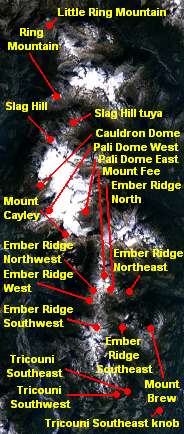Pali Dome facts for kids
Quick facts for kids Pali Dome |
|
|---|---|

Mount Cayley volcanic field
|
|
| Highest point | |
| Listing | List of volcanoes in Canada List of Cascade volcanoes |
| Geography | |
| Location | British Columbia, Canada |
| Parent range | Pacific Ranges |
| Geology | |
| Mountain type | Subglacial volcano |
| Volcanic arc/belt | Canadian Cascade Arc Garibaldi Volcanic Belt |
| Last eruption | Pleistocene/Holocene |
Pali Dome is a special kind of volcano located in the Pacific Ranges of the Coast Mountains. You can find it in southwestern British Columbia, Canada. It's part of the bigger Mount Cayley volcanic field. This volcano is unique because it formed under a thick layer of ice!
The name "Pali" comes from the Hawaiian word for "cliff" or "steep hill." "Dome" describes its shape, which is like a rounded, flat-topped hill made from thick, gooey lava.
What is a Subglacial Volcano?
Pali Dome is known as a subglacial volcano. This means it erupted underneath a glacier or a large ice sheet. Imagine hot, melted rock (lava) trying to push through a huge block of ice!
When lava erupts under ice, it cools very quickly. This fast cooling creates unique rock formations and shapes that you don't see with regular volcanoes. The interaction between ice and lava in the Mount Cayley volcanic field has created some amazing landforms over the last 2 million years.
Where is Pali Dome Located?
Pali Dome is part of the Mount Cayley volcanic field. This field is a group of volcanoes in the Garibaldi Volcanic Belt. This belt is a chain of volcanoes that stretches through British Columbia.
The area around Pali Dome is very scenic. It's known for its rugged mountains and beautiful landscapes.
When Did Pali Dome Last Erupt?
Pali Dome has been quiet for a very long time. Its last known eruption happened over 10,000 years ago. This was during a time when much of North America was covered in large ice sheets.
Even though it hasn't erupted recently, studying volcanoes like Pali Dome helps scientists understand how Earth's climate and geology have changed over thousands of years.
 | Georgia Louise Harris Brown |
 | Julian Abele |
 | Norma Merrick Sklarek |
 | William Sidney Pittman |

